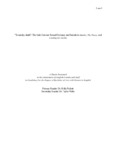"To muddy death": The Link Between Sexual Deviancy and Suicide in Hamlet, The Waves, and Looking for Alaska

View/
Author
Lora, Maya
Subject
Washington and Lee University -- Honors in English
Paraphilias in literature
Suicide in literature
Hamlet (Shakespeare, William)
The Waves (Woolf, Virginia)
Looking for Alaska (Green, John, 1977-)
Metadata
Show full item recordDescription
Thesis; [FULL-TEXT FREELY AVAILABLE ONLINE] Maya Lora is a member of the Class of 2020 of Washington and Lee University. At first glance, Shakespeare's Hamlet and Virginia Woolf's The Waves do not seem texts ripe for a new, deep examination of their themes. Both stories, penned by two geniuses from two different eras, have been poked and prodded at length by literary critics hoping to tear their linguistic meat limb from limb to discover the creative muscle lurking underneath. However, this essay will approach both texts and expose a link between them that will help explain a modern obsession with a certain kind of woman, who I would describe as the manic pixie dream girl in modern fiction -- such a woman makes a vivid appearance in John Green's Looking for Alaska. In essence, these stories present differing yet intimately connected versions of a woman both too innocent and too sexual for her own good, a risky combination that results in sexual deviance and a tragic death: suicide. The authorial use of suicide as a way to punish and control female characters stifles those characters' ability to use sexuality as a means of breaking female gender role expectations under rigidly enforced heteropatriarchy present in the novels. This literary tradition of punishing women on the cusp of revolution stems, I argue, from Ophelia, a tragic character who continues to inspire literature, songs, and other popular culture to this day.